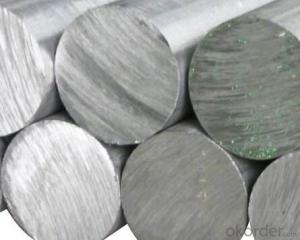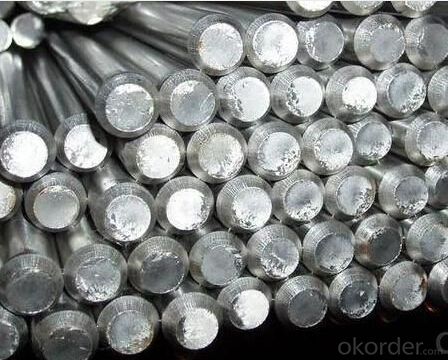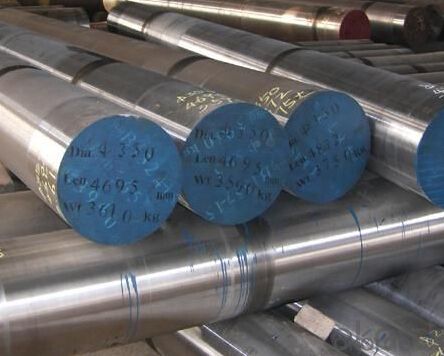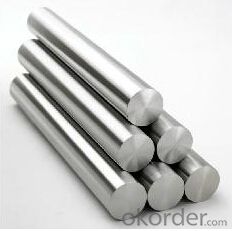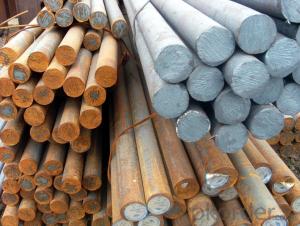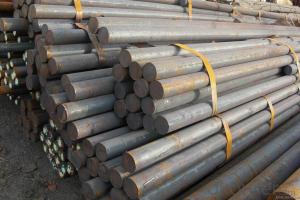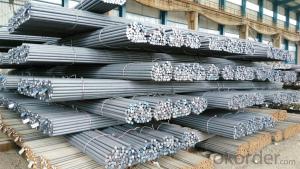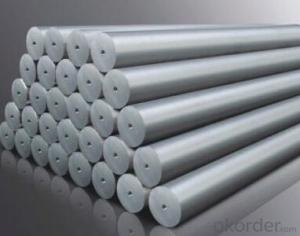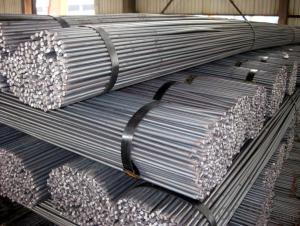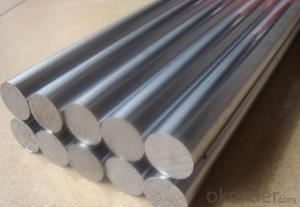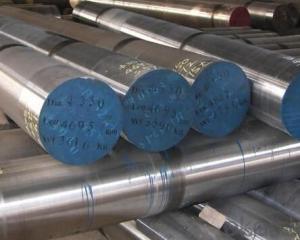Diameter 30-60mm Bearing Steel Round Bar
- Loading Port:
- Tianjin
- Payment Terms:
- TT or LC
- Min Order Qty:
- 500 m.t.
- Supply Capability:
- 1000000 m.t./month
OKorder Service Pledge
OKorder Financial Service
You Might Also Like
Product Description:
OKorder is offering Diameter 30-60mm Bearing Steel Round Bar at great prices with worldwide shipping. Our supplier is a world-class manufacturer of steel, with our products utilized the world over. OKorder annually supplies products to European, North American and Asian markets. We provide quotations within 24 hours of receiving an inquiry and guarantee competitive prices.
Product Applications:
Diameter 30-60mm Bearing Steel Round Bar are ideal for structural applications and are widely used in the construction of buildings and bridges, and the manufacturing, petrochemical, and transportation industries.
Product Advantages:
OKorder's Diameter 30-60mm Bearing Steel Round Bar are durable, strong, and resist corrosion.
Main Product Features:
· Premium quality
· Prompt delivery & seaworthy packing (30 days after receiving deposit)
· Corrosion resistance
· Can be recycled and reused
· Mill test certification
· Professional Service
· Competitive pricing
Product Specifications:
Grade | AISI 52100, ASTM E52100, DIN 1.3505,JIS SUJ2, GCr15 |
Dimensions | Diameter: 30-60mm Length: 2000-13000mm or as required |
Shape | Round Bar |
Type | Alloy Steel Bar |
Delivery Condition | Black Surface |
Material | Bearing Steel |
Technique | Hot Rolled |
Usage and Applications of Bearing Steel Round Bar
Bearing steels are used for ball and roller bearing applications and are comprised of low carbon steels and high carbon through harden able steel.
First the famous 1C-1.5Cr steel from which the majority of bearings are made. Its structure is apparently well-understood and the focus is on purity in order to avoid inclusions which initiate fatigue during rolling contact. Then there is the M50 steel and its variants, from which bearings which serve at slightly higher temperatures in aeroengines are manufactured, based on secondary-hardened martensite.
Tapered roller bearing are generally used to support combined load mainly consisting of radial load. Their cups are separable for easy assembling ,During mounting and using, radial clearance and axial clearance can be adjusted and preloaded mounting can be made.
Packaging & Delivery of Bearing Steel Round Bar
Packaging Detail: ASTM 52100 Steel in seaworthy packing or on customer request; Packed in bundles with standard export sea-worthy package or as customer require
Delivery Detail: 45 days after confirmed
Trade terms: FOB, CFR, CIF ou as customer's required
MOQ: 25 tons or at customer's demands. If the quantity is good, the price will be better.
Processing of Bearing Steel Round Bar
The processing of Bearing Steel Round Bar is hot rolled (strictly control sulphur, phosphorus and non-metallic inclusions content and distribution)
Chemical Composition of Bearing Steel Round Bar
C | Si | Mn | Cr | Ni | Cu |
Equal or less than | |||||
0.95-1.05 | 0.15-0.35 | 0.25-0.45 | Cr:1.40-1.65 | 0.30 | 0.25 |
All products' chemical composition and specification can be design according to customers' requirement.
Note of Bearing Steel Round Bar
1. According to national standard (GB) for our products, if not, supply according to national standards (GB) or agreement.
2. We can not only provide electric furnace +LF+VD and electros lag re-melting (ESR) steel forging materials, but also forging products of piece, bar, etc.
3. Our company is equipped with roll equipment and can provide our customers with roll billets or finished.
4. Please send us your detailed specifications when inquire. We will reply to you ASAP.
5. Certificate of quality is issued in English, in addition the normal terms, production process, the mechanical property (yield strength, tensile strength, elongation and hardness. forged ratio, UT test result, Grain size, heat treatment methods and the sample of is shown on the certificate of quality.
FAQ:
Q1: Why buy Materials & Equipment from OKorder.com?
A1: All products offered byOKorder.com are carefully selected from China's most reliable manufacturing enterprises. Through its ISO certifications, OKorder.com adheres to the highest standards and a commitment to supply chain safety and customer satisfaction.
Q2: How do we guarantee the quality of our products?
A2: We have established an advanced quality management system which conducts strict quality tests at every step, from raw materials to the final product. At the same time, we provide extensive follow-up service assurances as required.
Q3: How soon can we receive the product after purchase?
A3: Within three days of placing an order, we will begin production. The specific shipping date is dependent upon international and government factors, but is typically 7 to 10 workdays.
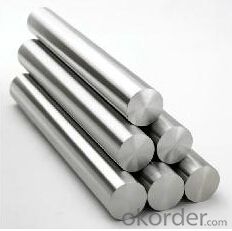
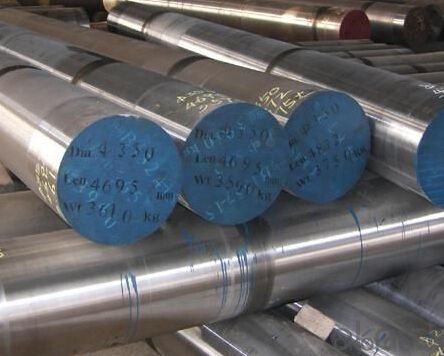
- Q: How does special steel contribute to the automotive exhaust system industry?
- Special steel plays a crucial role in the automotive exhaust system industry by offering several significant contributions. Firstly, special steel, such as stainless steel, is highly resistant to corrosion, which is a common issue faced by exhaust systems due to the exposure to high temperatures and corrosive gases. This corrosion resistance ensures the longevity and durability of the exhaust system, reducing the need for frequent replacements and repairs. Moreover, special steel possesses excellent heat resistance properties. The exhaust system operates under extreme temperatures, and special steel can withstand these conditions without undergoing deformation or structural damage. This ability to handle high temperatures ensures that the exhaust system functions efficiently and maintains its performance over an extended period. In addition, special steel offers exceptional strength and durability. The exhaust system is subjected to constant vibrations, impacts, and stress due to road conditions and engine movements. Special steel's high strength and toughness enable the exhaust system to withstand these forces, preventing premature failures and ensuring the safety and reliability of the vehicle. Furthermore, special steel allows for the design and manufacturing of complex and lightweight exhaust system components. With advancements in steel technology, manufacturers can create intricate shapes and thin-walled structures, reducing the overall weight of the exhaust system. This weight reduction contributes to improved fuel efficiency and vehicle performance, as it reduces the overall load on the engine. Lastly, special steel provides the automotive industry with the flexibility to meet increasingly stringent emission regulations. By utilizing special steel in the exhaust system, manufacturers can incorporate catalytic converters and other emission control devices effectively. These devices play a vital role in reducing harmful emissions, such as carbon monoxide, nitrogen oxides, and particulate matter, helping vehicles meet environmental standards. In conclusion, special steel is an essential component in the automotive exhaust system industry. Its corrosion resistance, heat resistance, strength, and lightweight properties contribute to the longevity, reliability, and performance of the exhaust system. Moreover, special steel enables compliance with emission regulations, ensuring that vehicles are environmentally friendly. Overall, special steel plays a critical role in enhancing the efficiency and sustainability of the automotive exhaust system industry.
- Q: How does special steel perform in extreme heat conditions?
- Special steel performs exceptionally well in extreme heat conditions. It has excellent heat resistance properties, enabling it to maintain its strength and structural integrity even at high temperatures. This makes it highly suitable for applications that involve exposure to extreme heat, such as in industrial furnaces, jet engines, and power plants. Its ability to resist thermal deformation and retain its mechanical properties ensures optimal performance and safety in such demanding environments.
- Q: What are the applications of special steel in the railway industry?
- Special steel has a wide range of applications in the railway industry. It is commonly used in the manufacturing of rails, which need to be durable and able to withstand heavy loads and constant wear and tear. Special steel is also used in the construction of railway bridges and tunnels, as it offers high strength and resistance to corrosion. Additionally, special steel is used in the production of various railway components such as wheels, axles, and couplers, ensuring safety and reliability in train operation.
- Q: How does special steel contribute to the telecommunications industry?
- The telecommunications industry relies heavily on special steel, which plays a vital role by offering the necessary strength, durability, and resistance to various environmental factors. Special steel finds its primary use in the manufacturing of transmission towers, antenna systems, and other supporting structures in telecommunications. For instance, transmission towers serve as the backbone of the telecommunications network, requiring the ability to withstand extreme weather conditions like strong winds, heavy precipitation, and even earthquakes. Special steel ensures the stability and functionality of these towers under such challenging circumstances due to its high tensile strength and resistance to corrosion. Furthermore, antenna systems also benefit from the use of special steel. Whether it's for satellite communication or wireless networks, antennas require materials with excellent electrical conductivity and low signal loss. Special steel alloys meet these requirements, enabling efficient signal transmission and reception. Moreover, special steel offers the advantage of being lightweight while maintaining its strength, making it ideal for constructing structures that need to be installed at significant heights, such as telecommunication towers. By utilizing special steel, telecommunications companies can achieve cost savings in both construction and transportation. Additionally, the durability and resistance to corrosion of special steel make it ideal for long-term use in the telecommunications industry. These properties contribute to the extended lifespan of structures and equipment made from special steel, reducing maintenance and replacement costs. The longevity of special steel also enhances the overall reliability and stability of the telecommunications network. In summary, special steel's unique properties, including its strength, durability, resistance to environmental factors, and efficient signal transmission capabilities, make it an essential material in the telecommunications industry. By providing support and reliability, special steel significantly contributes to the seamless operation of communication networks, enabling efficient and reliable connectivity for individuals and businesses worldwide.
- Q: What are the different grades of special steel?
- There are several grades of special steel, including stainless steel grades such as 304, 316, and 430; tool steel grades like D2, O1, and A2; and high-speed steel grades such as M2 and M42. Each grade has unique properties and applications, making them suitable for various industries and specific purposes.
- Q: How does special steel compare to other materials?
- Special steel is known for its exceptional strength, durability, and resistance to corrosion, making it superior to many other materials. Its unique composition and manufacturing processes result in improved performance, higher load-bearing capacity, and enhanced safety compared to other materials. Additionally, special steel offers excellent heat resistance, making it suitable for a wide range of applications, including automotive, construction, and aerospace industries.
- Q: How is wear-resistant stainless steel used in the production of cutting tools?
- Wear-resistant stainless steel is used in the production of cutting tools because of its high strength, hardness, and corrosion resistance. This makes it suitable for applications where the tools need to withstand intense cutting forces and maintain sharpness over extended periods. The wear-resistant properties of stainless steel ensure that the cutting edges retain their sharpness and durability, resulting in efficient and reliable cutting performance.
- Q: What are the requirements for special steel used in corrosive environments?
- To ensure durability and performance in corrosive environments, special steels must possess specific properties. The requirements for these steels can be summarized as follows: 1. Excellent corrosion resistance is the primary requirement. The steels should be able to withstand aggressive substances like acids, alkalis, and salts without showing signs of corrosion. This ensures the longevity of the steel and maintains its performance. 2. High strength is crucial for handling mechanical stresses imposed on the steel in corrosive environments. It is particularly important for applications with heavy loads, pressures, or impacts, as it helps maintain the steel's integrity and structural stability. 3. Resistance to pitting and crevice corrosion is essential. These localized forms of corrosion can occur in the presence of certain aggressive chemicals or stagnant environments. Steels should be resistant to such forms of corrosion to prevent localized damage and potential failure. 4. Resistance to stress corrosion cracking is necessary. This phenomenon occurs when a corrosive environment compromises the material's integrity under tensile stress. Special steels should be resistant to stress corrosion cracking to ensure reliability under applied loads. 5. Good resistance to intergranular corrosion is important. This type of corrosion along grain boundaries weakens the material. Special steels used in corrosive environments should have resistance to intergranular corrosion to maintain structural integrity. 6. Thermal stability is essential for high-temperature corrosive environments. Special steels should exhibit thermal stability to resist degradation and maintain their properties in elevated temperatures. 7. Ease of maintenance is a desirable characteristic. Special steels used in corrosive environments should be relatively easy to clean, resistant to fouling or scaling, and compatible with commonly used cleaning agents or procedures in the industry. It is important to note that the specific requirements for special steels in corrosive environments may vary depending on the application and type of corrosive substances encountered. Therefore, careful consideration of specific needs and consultation with experts in the field is crucial for selecting the most appropriate steel for each corrosive environment.
- Q: What are the specific requirements for special steel used in the nuclear waste storage industry?
- The specific requirements for special steel used in the nuclear waste storage industry are stringent and critical for ensuring the safety and long-term viability of the storage facilities. These requirements are primarily driven by the need to mitigate the potential risks associated with nuclear waste, such as radiation leakage and corrosion. One of the key requirements is high strength and durability. Special steel used in nuclear waste storage must have exceptional mechanical properties to withstand the weight and pressure exerted by the waste containers and the surrounding environment. This includes resistance to deformation, fracture, and fatigue, as well as the ability to maintain its structural integrity over an extended period. Another crucial requirement is excellent corrosion resistance. Nuclear waste contains highly corrosive substances that can degrade regular steel over time. Therefore, special steel used in the nuclear waste storage industry must have enhanced corrosion resistance to ensure long-term durability and prevent leakage of radioactive materials. Moreover, the steel must have a low susceptibility to stress corrosion cracking (SCC). SCC occurs when a combination of tensile stress, corrosive environment, and specific material conditions result in crack initiation and propagation. Given the potential consequences of a breach in the storage facility, the steel used must be highly resistant to SCC to ensure the integrity of the containers and minimize the risk of leakage. Radiation resistance is also a critical requirement for special steel used in nuclear waste storage. The steel should exhibit minimal degradation or embrittlement when exposed to high levels of radiation. This is essential to maintain the structural integrity of the storage containers and prevent any weakening that could compromise the containment of the waste. Additionally, the special steel used in the nuclear waste storage industry must comply with strict regulatory standards and certifications. It must meet specific design codes and guidelines set by regulatory authorities to ensure compliance with safety regulations and minimize potential hazards. In summary, the specific requirements for special steel used in the nuclear waste storage industry include high strength, durability, corrosion resistance, low susceptibility to stress corrosion cracking, radiation resistance, and compliance with regulatory standards. These requirements are crucial for maintaining the safety and integrity of the storage facilities and preventing any leakage or release of radioactive materials into the environment.
- Q: What are the properties of low-alloy steel?
- Low-alloy steel possesses several properties that distinguish it from other types of steel. Firstly, it contains a lower percentage of alloying elements compared to other alloy steels. This leads to a reduction in the overall cost and increases the weldability and formability of the steel. Additionally, low-alloy steel exhibits improved strength and toughness, making it suitable for applications requiring high structural integrity. It also offers resistance to corrosion and abrasion, enhancing its durability and longevity. Furthermore, low-alloy steel can be heat-treated to further enhance its mechanical properties, such as hardness and ductility.
Send your message to us
Diameter 30-60mm Bearing Steel Round Bar
- Loading Port:
- Tianjin
- Payment Terms:
- TT or LC
- Min Order Qty:
- 500 m.t.
- Supply Capability:
- 1000000 m.t./month
OKorder Service Pledge
OKorder Financial Service
Similar products
Hot products
Hot Searches
Related keywords
